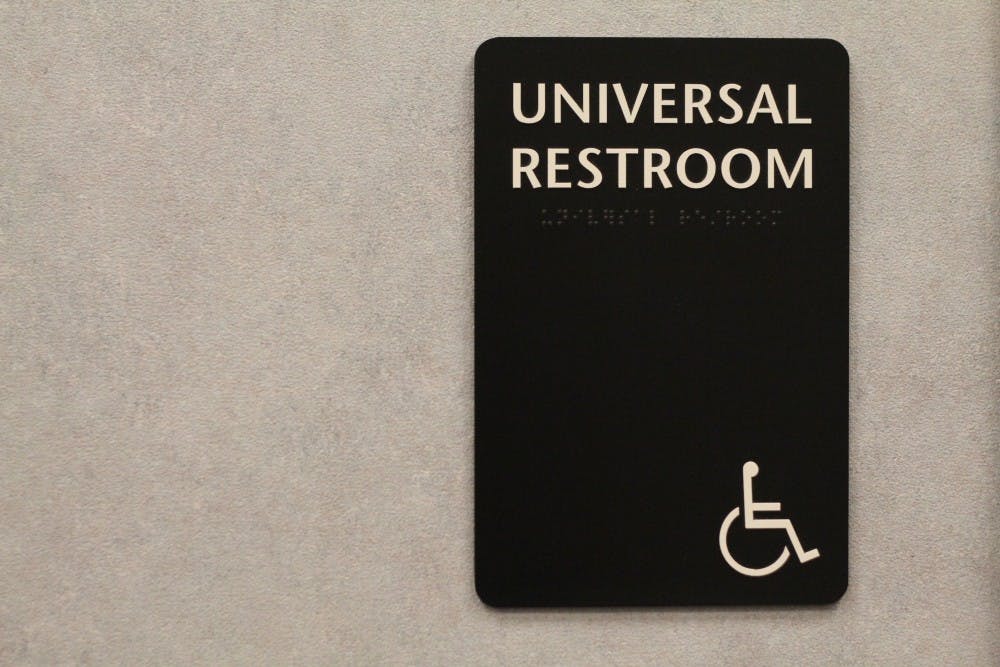From academics to social life, Elon University’s commitment to inclusivity manifests itself in many ways throughout campus. To this end, for the past two years, administration has cracked down on restroom inclusivity.
Prior to the creation of the Gender & LGBTQIA Center (GLC), there were less than 15 bathrooms on campus open to students of all genders and sexes. One year later, more than 70 were built. This year, the number of universal bathrooms has progressed to 90.
From unisex to universal
Matthew Antonio Bosch, director of the GLC, said the term used to describe gender-inclusive bathrooms two years ago was not as open to all genders and sexes as they are actually today.
“They used to be labeled ‘unisex bathrooms,’ which makes people think of one sex,” Bosch said. “But this was before the advent of thinking of multiple genders and sexes.”
The term “universal” captures the variety of identities that fall under the sex and gender spectrum. Bosch said a significant reason behind choosing the term was that it is accessible to everyone — including people with disabilities or outside guests who visit the campus during large events.
“There might even be a father who wants to take his three-year-old daughter to the bathroom but doesn’t know if he should take her to the men’s restroom or the women’s,” he said. “Despite gender identity and despite disability access, there are still plenty of situations where people of multiple genders need to use a restroom.”
The re-signing process
When the office was created, Bosch led a restroom assessment and began to look at places on campus where long lines would form outside restrooms. Realizing that many of these restrooms were labeled “men” or “women” but were single stalled and lockable, Bosch pushed to change their signs and ensure that they were accessible to people with disabilities.
“There wasn’t much reconstruction, per se,” he said. “It was just a matter of finding these spaces and re-signing them.”
Because of several factors including the fire code, the campus could not construct universal restrooms on every single floor — but with the exception of Historic and Danieley Neighborhoods, all residence buildings have at least one universal bathroom.
Bosch said he is very appreciative of Physical Plant and Construction Management for cooperating and realizing the significance of universal bathrooms.
“Those spaces could have easily been mechanical rooms or storage facilities,” he said. “It’s not easy on their behalf to say, ‘This is why we need to remove some space in order to carve out some space for a universal restroom.”
Bosch said because of the administrative support behind restroom-inclusivity, universal bathrooms are being included in blueprints for buildings that are now in construction, including McEwen’s new School of Communications.
“From now on, it won’t even be a question — universal bathrooms will appear in blueprints because of the campus support,” Bosch said.
Elon senior Samantha Allen said the existence of universal bathrooms is another step in a right direction for all-campus inclusivity.
“I feel absolutely comfortable,” she said. “I’ve never felt that gender identity is black or white and everyone, especially on a college campus, should feel comfortable walking into a bathroom that doesn’t put them in a box.”
Is it enough?
While universal bathrooms are accessible to students in most residential buildings, they are not accessible on every floor. For traditional-style on-campus housing — which is common in Historic — most restrooms on the hall are multi-stalled and gender binary.
This means a student conforming to a gender outside male or female would have to either use a bathroom that doesn’t align with their gender or travel upstairs or downstairs to find a universal one.
“I would love to see them everywhere,” Bosch said. “But it has a lot to do with the fire code.”
He does not foresee multi-stalled universal restrooms being created in the near future.
“The question of having universal multi-stalled restrooms is tricky in a university setting simply because it is a newer concept,” he said. “I don’t think Elon is fully ready to move in that direction yet — there would need to be a lot more education and explanation, especially for parents of prospective students.”
Allen said while it may take some time for the community to get used to and while it may mean maneuvering around logistical issues, such as including showers, it is necessary.
“I hate doubting Elon’s ability to accept, because for the last three years I’ve been blown away with the changes that have occurred on this campus,” she said. “But if just one person would be more comfortable if we had it, then I think it is something that needs to happen.”


